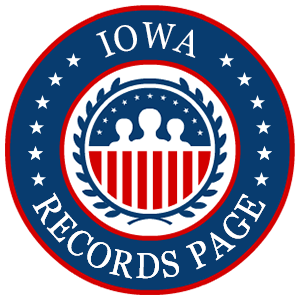Search free Iowa marriage records through online databases and public record search tools.
Couples are legally required to get a marriage license before marrying in the state of Iowa. After the wedding ceremony, they receive a certified copy of their marriage certificate. These official documents constitute marriage records and show that a couple has been legally married.
This resource provides helpful instructions on how to find out if someone is married in Iowa and order copies of specific records from various offices.
Public Availability of Marriage Records & Certificates in Iowa
Thanks to the Freedom of Information Act (FOIA) and Iowa’s Open Records Law (Iowa Code §§ 22.1 — 22.16), everyone has the right to access public records, except where an exemption applies (e.g., sensitive personal information).1
The statewide registration of vital events, including births and marriages, officially began in Iowa in July 1880. Earlier, they were locally recorded by the county where the events occurred.
Iowa maintains a huge, centralized registration system for vital records known as Iowa Vital Events System (IVES) which is not open to the public. However, marriage records preserved in state archives that are at least 75 years old are freely accessible to the public.
As per IC §§ 144.43, the marriage records maintained by county recorders in Iowa are considered as public records may be made publicly available upon request. However, social security numbers of the spouses, being confidential information, cannot be disclosed.
While requests for copies can be made both at the local and the state level, only some persons are entitled to receive a certified copy of an original document. So, before making a request, it’s important to be informed about the eligibility requirements and the application process.
An alternative means to check public marriage and divorce records is by using third party search websites. Although these sites do not provide official copies or original documents, they obtain their data from a variety of sources, so the users are more likely to get the information they are looking for.
As per CDC/National Center for Health Statistics Data, Iowa marriage rates stood at 5.3 per 1,000 people in 2021; this was an increase from the previous year, when the rate was 4.9.2
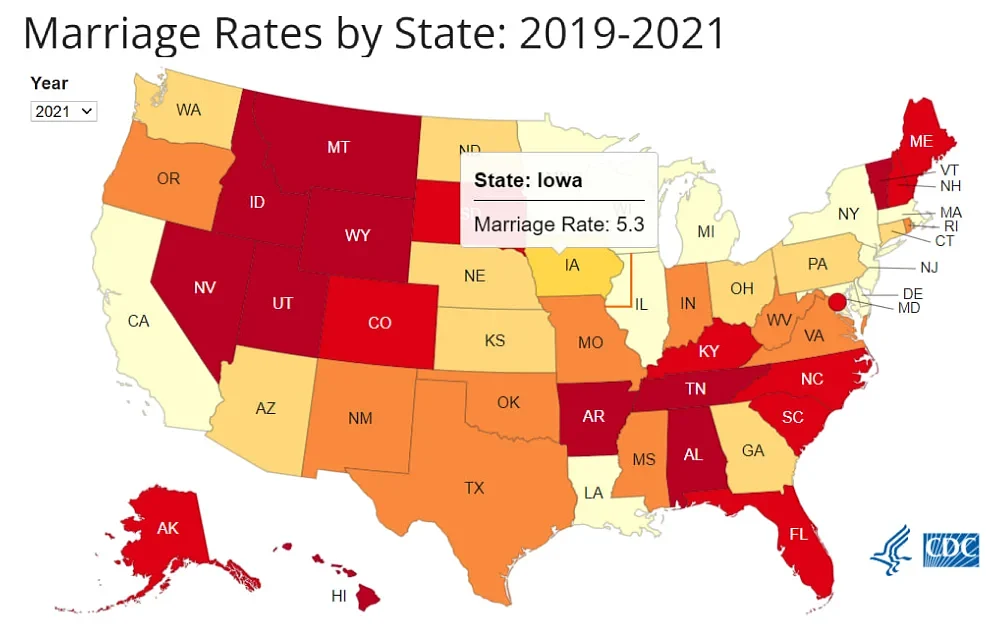
How To Check Iowa Marriage Records & Certificates
To search for marriage records in Iowa or to get a certified copy of the record, citizens can reach out to either the Bureau of Vital Records – a division of the Iowa Department of Health & Human Services (HHS) – previously known as the Iowa Department of Public Health, or a local county registrar (also known as “county recorder”) office.
These two agencies are responsible for issuing copies of marriage records (both certified and non-certified) and handling requests for information pertaining to marriage events in Iowa.
The Bureau of Vital Records, Iowa’s vital records office, stores and maintains statewide marriage records dating all the way back to the 1880s.
A statewide marriage index is available at this office for marriage events after 1916. Marriages between 1921 and 1941 can be retrieved through this department only and are not kept by county recorders. A marriage marriage records search can be requested at state level through this bureau.
The bureau accepts requests for certified copies of these records. The process involves filling out an Application To Order a Marriage Record in Iowa and sending it to the HSS office with proper identification and an affordable fee ($15 per search).3 Whatever the type of request is—state or local—the same application form can be used.
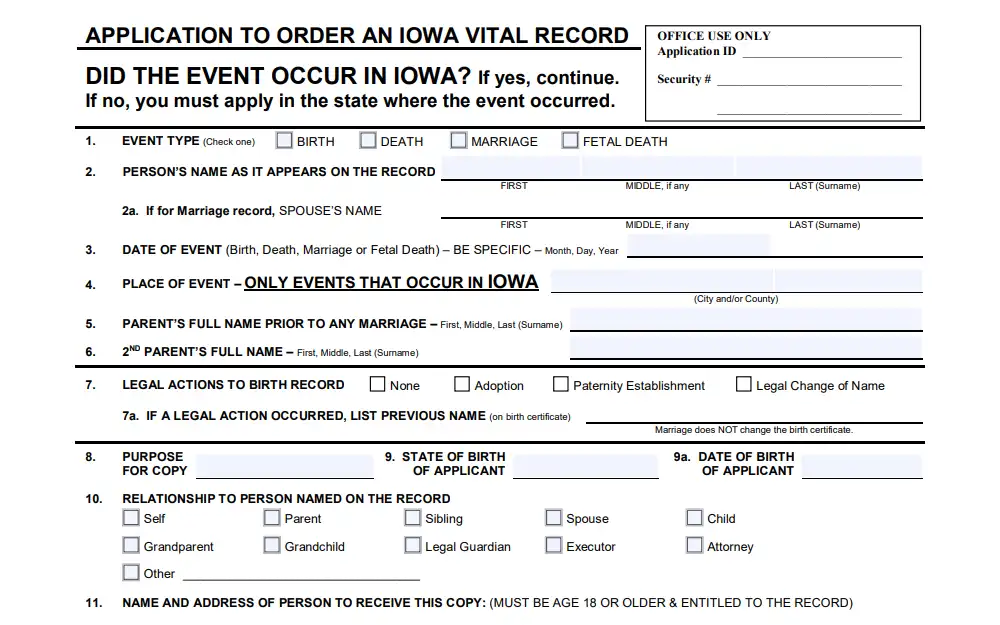
Interested persons can contact the office in any of the four ways outlined below.
- Mail: The completed marriage certificate application form, in addition to the appropriate fee mentioned above and a clear photo of the requester’s government-issued ID may be mailed to the following address:
Iowa Department of Health & Human Services
Bureau of Vital Records
321 East 12th Street (Lucas Office Building)
Des Moines Iowa 50319-0075
The application should be duly notarized for orders by mail.4 Checks or money orders are accepted and to be made payable to the “Iowa Department of Health and Human Services”. Once an application is processed, a regular mailing service may take up to 6 weeks to get the documents delivered.
For faster delivery, place an order by phone or online.
- In-person: The fastest way to get a marriage certificate copy in Iowa is to walk into the Bureau of Vital Records office (at the same address noted above). Applications that are properly filled and submitted on a weekday are usually processed within two hours.
- Telephone: Requesters can contact the Bureau of Vital Records by calling 515-281-4944 to speak directly with the office’s staff.
They may also call VitalChek at +1-866-809-0290. VitalChek is a government-authorized third-party provider of marriage certificates and other vital records. VitalChek can be reached either by phone or via their website.
For more information on fees, shipping options and delivery times, inquirers can refer to the department’s guidelines on how to request a certified vital record.5
- Online: The state’s vital records official website does not have any lookup tools or portals allowing users to search marriage records online; however, the VitalChek website is endorsed by the government and can be used for this purpose, though their fast and convenient delivery options come with additional fees.
It is important to note that only certain eligible individuals can receive certified copies of marriage records in Iowa, such as the parties named on the record, their close family members or authorized representatives.6
The requester needs to prove their entitlement and should be able to identify the record as clearly as possible, including the date of the marriage, the city or the county where the event was held to make their request specific.
The Iowa State Vital Records Office does not have marriage records earlier than 1880. At that point of time, the state itself hadn’t been formed and only some marriages were recorded by local counties. So, counties have played a key role in the creation and preservation of marital records at the local level, starting with historic times to the present day.
Searching Counties & Cities in Iowa for Marriage Records or Licenses
State-level searches may show broader results covering the whole of Iowa, while a local search gives more specific and refined results for marriage records.
To find out if a person has applied for a marriage license or if they got married in Iowa, searchers may visit the county recorder in the county where the marriage license may have been issued. Here is the directory of all 99 counties in Iowa.7
At the recorder’s office, anyone can look up marriage license in Iowa by giving details such as the couples’ names, an approximate date that they applied to get married, etc.
Ordering a record from the state office can be costlier than ordering from the county offices. Moreover, in-person requests are processed faster and are typically more effective because of the face-to-face immediate support available.
For marriages that took place in Iowa from 1954 to the present day, certified copies of marriage records can be obtained from any county.
For marriages prior to 1954, certified copies can be requested at the county where the original application was filed. Some examples of how to acquire these records at the county level can be found below:
- The Polk County Recorder’s office allows the requesters to write to the recorder or visit the office in person to request for a certified copy of a marriage certificate (with a raised, official seal) by filling out an application and paying $15 per request by cash, check or credit card.
- The Linn County Recorder follows the same procedure of accepting marriage records search and certified copy requests by mail or at the office with the same search fee and a valid government-issued photo ID of the requester.8
- The Scott County Recorder similarly processes in-person requests as well as applications by mail. However, personal checks are not accepted at this office.
- The Johnson County Recorder and rest of the counties in Iowa follow the same general process when it comes to issuing certified copies of marriage licenses.
Many county recorders in Iowa are responsible for recording and maintaining a wide variety of official documents (including marriage records) for the cities of Iowa.
For example, the City of Des Moines (capital city of the state) relies on the Polk County Recorder for maintaining wedding registration data while the Scott County Recorder’s Office processes marriage license applications for Davenport City. Likewise, marriage licenses in Cedar Rapids are handled by the Linn County Recorder’s office.
However, some of the county marriage records have some gaps; for example, some records may appear in an abbreviated form without having information such as the place of birth or parents’ names of the bride and groom. Hence, when a county recorder is not able to find a record, the application may be forwarded to the state registrar.
Some older marriage records have already been digitized while some of them are still available only in paper or microfilms in state archives which can be used for genealogical research.9 More details on historical records will be covered in the following section.
How To Look Up Ancestry Marriage Records in Iowa at No Cost
Early records of marriages can be used for genealogical research i.e., to find information about someone’s past generations. The State Historical Society of Iowa has collected and archived marriage records dating back to the 1800s.
Marriage records that are at least 75 years old are open to the public; anyone can view them completely free of charge at Des Moines and Iowa City Historical Research Centers.10
Interested parties who are unable to make a trip to a research center, can refer to the state archives vital records indexes and browse through the government-endorsed resources online.
The State Historical Library and Archives handles requests for uncertified copies of records from the state archive collections over the phone or by filling out a form online.11
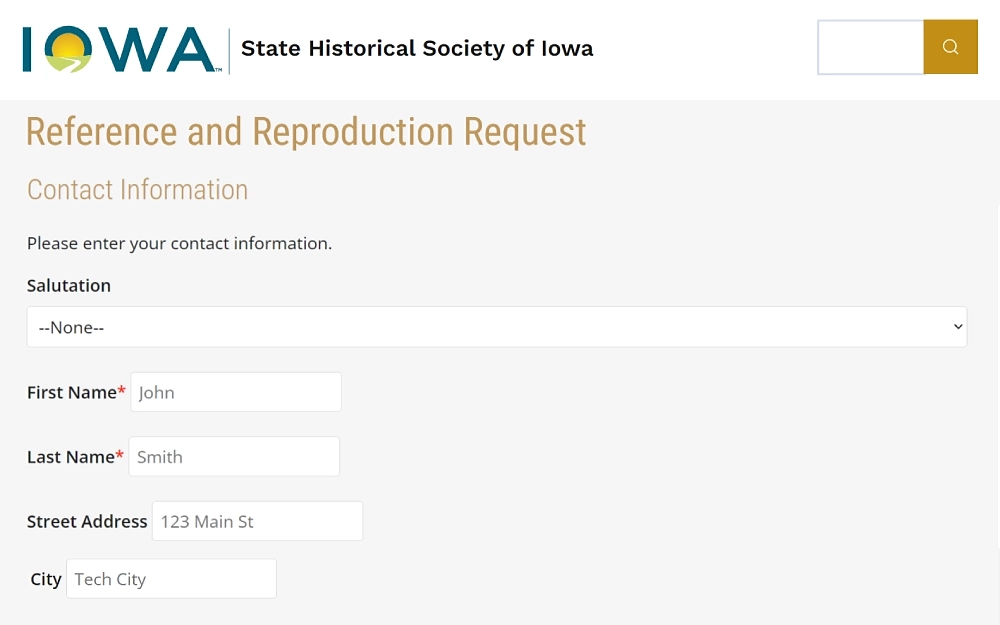
For certified copies, researchers may contact the Bureau of Health Statistics and check their index schedule for state vital records.12 Additional genealogical resources can be found at the Iowa Genealogical Society.
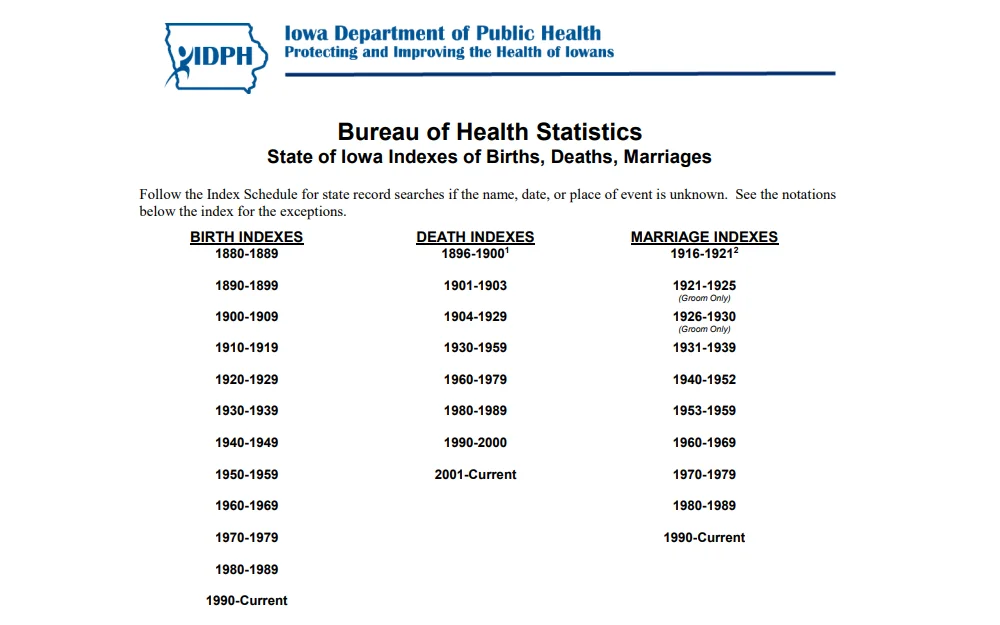
Note: Iowa state and county websites do not provide a free marriage license search tool where users could find comprehensive listings of all records in one place.
Is Iowa a Common Law Marriage State?
Iowa is among the few U.S. states that recognize common law marriage. It is a kind of relationship in which the parties have neither applied for a marriage license nor had a wedding ceremony, yet they socially declare themselves to be husband and wife.
As per IAC 701—73.25(425), for a common law marriage to be approved, both parties must at least have the intention to marry, and they must live together for some time (although a specific length of time hasn’t been provided).13
In Iowa, a marriage license application and a certificate of marriage are the two key documents to prove the legitimacy of a marriage. Since a common law marriage requires no such documents, they do not enter Iowa’s state vital records system.
There is no definite way to find out who is in a common law marriage since the relationship, by default, is “social” and does not exist in public marriage records (unless decided by court).
Same-sex marriages have been legal in Iowa and same-sex couples are entitled to the same benefits as heterosexual couples. Marriage licenses are issued as usual allowing the state vital records system to make an entry of those records, suitable to be retrieved and used later.
In Iowa, a premarital agreement – commonly known as prenuptial agreement or “prenup” – is not a public record unless it becomes a subject of dispute or any kind of legal proceeding.
How To Acquire a Marriage License in Iowa
Marriage license application requirements are the same across the state of Iowa. The applicants must:
- Be at least 18 years of age (to be performed without parental consent)
- Have no other living spouses at the time of the marriage
- Not be related to each other by birth (e.g., first cousins)
- Be competent enough to enter a legal contract like marriage
- Be able to present valid government-issued IDs as proof of their identity and age
Those who meet the criteria can contact their local recorder’s office and apply for an Iowa marriage license.14
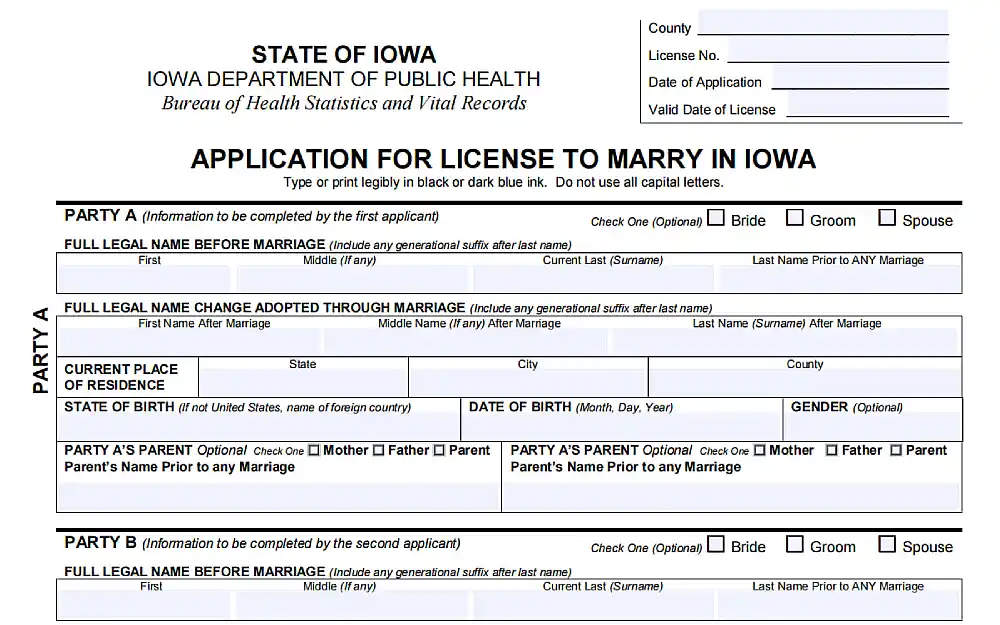
Here is the complete list of counties in Iowa to find contact details for each recorder’s office. The application will cost $35, and this fee is the same for Iowa residents as well as residents from other states.
For applicants aged between 16 and 18, a consent form for a minor’s marriage should be signed by their parents or legal guardian, following which the district court judge may approve their marriage. Individuals under 15 are ineligible to get married in Iowa.22
It is not necessary to apply for a marriage license in the county where the couple lives, but a marriage license issued in Iowa cannot be used for ceremonies held outside the state.
The marriage application process can vary (e.g., choice of payment – cash/cards, hours of operation) depending on the county recorder’s office where the application is being filed.
Many Iowa counties (such as Polk County and Scott County offices) may permit couples to apply for a marriage license online. Alternatively, a blank marriage application form can be obtained from the recorder’s office. Once the request is accepted, either party can arrive and pick up the marriage license from the same office.
In Iowa, the marriage license waiting period is three to five business days. This means a couple has to wait for the prescribed amount of time for the license to be valid allowing them to engage in matrimony. Those who want to speed up the process can request a waiver for a three-day waiting period before a district court judge.15
Following the ceremony, the officiant (person who solemnized the marriage) fills the marriage certificate and sends it back to the county registrar where it was issued. In return, the county registrar sends a copy of the original marriage certificate to the couple. Extra copies can be obtained for an additional fee.
Applicants can refer to the state-issued instructions on how to get married in Iowa.16
While the internet can be a superb tool for finding marriage records, it’s a much more seamless process when you know where to look and which databases or offices to go through; to make the process clear and streamlined, this resource has been designed to help users find Iowa marriage records in the quickest and most effective ways possible.
On the other hand, if you’re seeking documentation of marriages that have since been dissolved, you may refer to the Iowa divorce lookup process; for additional information or other record types (arrests, warrants, probation, parole, property, court cases, and more), you can rely on the guidance in the IA free public record search overview.
References
1Iowa Legislature. (2022, December 29). Chapter 22: Examination Of Public Records (OPEN RECORDS). Retrieved November 26, 2023, from <https://www.legis.iowa.gov/docs/ico/chapter/22.pdf>
2Centers for Disease Control and Prevention, National Center for Health Statistics. (2023, February 10). Marriage Rates by State: 2019-2021. Retrieved November 26, 2023, from <https://www.cdc.gov/nchs/pressroom/sosmap/marriage_by_state/marriage_rates.htm>
3Iowa Department of Health and Human Services, Bureau of Health Statistics. (2023, July). Application for an Iowa Vital Record. Retrieved November 26, 2023, from <https://hhs.iowa.gov/media/3054/download?inline>
4Iowa Department of Public Health. (2017, May 01). Identity Documents for Entitlement/Notarization. Retrieved November 26, 2023, from <https://hhs.iowa.gov/media/3056/download?inline>
5Iowa Department of Health and Human Services, Bureau of Health Statistics. (n.d). How to Request a Certified Record. Retrieved November 26, 2023, from <https://hhs.iowa.gov/programs/vital-records/how-request-certified-record>
6Iowa Department of Health and Human Services, Bureau of Health Statistics. (2018, August 01). Direct and Tangible Interest to a Certified Copy in Iowa. Retrieved November 26, 2023, from <https://hhs.iowa.gov/media/8886/download?inline>
7Iowa State Association of Counties. (n.d). County Directory. Retrieved November 26, 2023, from <https://www.iowacounties.org/member-resources/county-directory/>
8Linn County Iowa. (n.d). Submit a Request for a Vital Record. Retrieved November 26, 2023, from <https://www.linncountyiowa.gov/1666/Submit-a-Request-for-a-Vital-Record>
9State Historical Society of Iowa. (n.d). County Records. Retrieved November 26, 2023, from <https://history.iowa.gov/history/research/collections/county-records>
10State Historical Society of Iowa. (n.d). Iowa History Research Centers. Retrieved November 26, 2023, from <https://history.iowa.gov/history/research/research-centers>
11State Historical Society of Iowa. (n.d). Reference and Reproduction Request. Retrieved November 26, 2023, from <https://history.iowa.gov/history/form/referencerequest>
12Iowa Department of Health and Human Services, Bureau of Health Statistics. (n.d). Vital Records. Retrieved November 26, 2023, from <https://hhs.iowa.gov/programs/vital-records>
13Iowa Legislature. (2006, December 04). 701—73.25(425) Common Law Marriage Iowa. Retrieved November 26, 2023, from <https://www.legis.iowa.gov/docs/iac/rule/04-12-2006.701.73.25.pdf>
14Iowa Department of Public Health, Bureau of Health Statistics and Vital Records. (2016, July 01). Application for License to Marry in Iowa. Retrieved November 26, 2023, from <https://pocahontascounty.iowa.gov/wp-content/uploads/2018/02/State-of-Iowa-Application-for-License-to-Marry-.pdf>
15Linn County Iowa. (2009, April). Application for Waiver of 3-Day Waiting Period. Retrieved November 26, 2023, from <https://www.linncountyiowa.gov/DocumentCenter/View/21756/3-Day-Marriage-Waiver-Application?bidId=>
16Linn County Iowa (2016, July 01). State of Iowa Marriage Instructions. Retrieved November 26, 2023, from <https://www.linncountyiowa.gov/DocumentCenter/View/9246/Marriage-Application-Instructions>
